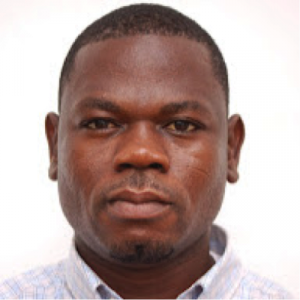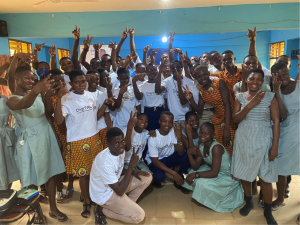

1. Why do you think it was important for the DigiTAL project to incorporate working with youth?
It was important to incorporate the youth in the DigiTAL project because;
a) Youth keep up with current technology and easily accept innovation, therefore it was important to incorporate them in the DigiTAL project so they could appreciate and utilize the innovative platforms provided by DigiTAL to disseminate climate information to others.
b) The youth in their aspiration to acquire livelihoods and wealth, sometimes engage in unsustainable agricultural practices and illegal mining activities, therefore their engagement in the DigiTAL project was crucial as it has made them better aware of the negative impacts of these activities on the environment and has provided them with the requisite knowledge and information to adopt climate smart practices and other sustainable environmental management practices in their endeavors.
c) The future belongs to the youth and climate change will certainly shape that future. Therefore, the youth need to transform their knowledge and attitudes to become environmentally responsible so they can relate sustainably with nature in order not to damage the future that belongs to them.
2. What DigiTAL activities do you think the youth you worked with found the most interesting or engaging and why?
a) The drama shows; because the drama show provided the students with the opportunity to display their talents by providing education on climate smart crop and livestock production in a dramatized form on live radio.
b) The radio talk-show was also interesting to the students because it was their first time of being in a radio station and conducting a live radio discussion on climate smart water management, the enthusiasm from the youth was so high to partake in the radio talk-show so their friends, colleagues and family members could hear them talk on live radio on matters of climate change adaptation and mitigation.
3. Did anything about your work with the youth in the Upper West region surprise you or change your thinking at all?
a) Yes, I got surprised at a point in working with the youth because I realized most of them lacked basic knowledge about climate change, climate change adaptation and mitigation practices and the roles they could play to contribute to a resilient society against climate change.
4. Have you gotten any interesting feedback from the community members or teachers about the DigiTAL youth activities?
a) Yes. Community members who watched and listened to the radio talk-show gave a lot of testimonies on key lessons they learnt from the youth activities including climate smart soil management, climate smart water, crop and livestock management. A lot of the teachers also testified they had learnt a lot from the youth activities and were going to invest in climate smart backyard gardens to supplement their family’s income.
5. How has working with the youth on DigitAL contributed to your academic or career goals?
a) One of my career goals has been to contribute to a more knowledgeable society regarding climate change adaptation and mitigation in the agriculture and energy sectors through research. Working with the youth on the DigiTAL project has therefore contributed to my career goal because it afforded me the opportunity to use the DigiTAL platforms through the youth activities to communicate and provide more knowledge to farmers on climate smart agriculture based on research findings. It also gave me the opportunity as a young career researcher to identify information and knowledge gaps that ought to be addressed through research.
DigitAL advances the work of the Adaptation at Scale in Semi-Arid Regions (ASSAR) project, a consortia of the Collaborative Adaptation Research Initiative in Africa and Asia (CARIAA). ASSAR findings showed significant information gaps across national and subnational scales in Ghana, hindering effective climate actions at the rural level. To bridge gaps and strengthen adaptive capacity of local stakeholders, ASSAR emphasized research for impact in Upper West, Ghana through innovative methods including the establishment of Climate Advisory Resource Centres (CARCs) and an adaptation-focused mobile app, training in leadership/advocacy and business for local women, and water and soil management for farmers. DigitAL builds on and extends this work through utilizing a participatory approach to better understand diverse stakeholder’s information needs, the tools that might work best for them, and the innovative ways to make it accessible to all.


